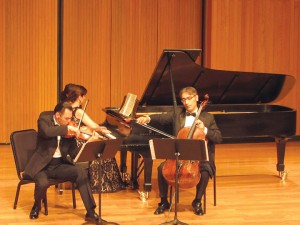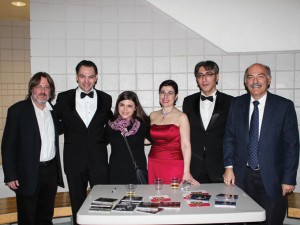Staff Writer
Aramayis Orkusyan

The vibrant, emotionally rich cascades of Armenian influenced melodies filled the Fresno State Concert Hall on the evening of November 14, 2014, as the Khachaturian Trio of Armenia performed for a sold-out audience of more than 300.
The Trio’s repertoire included the dramatic, deftly nuanced, passionate and powerful sounds of Rachmaninoff’s “Trio élégiaque No. 2 in D. Minor, Op. 9,” the rich works of Arno Babajanian’s “Trio in F-sharp Minor,” which showcased a deep influence by Armenian traditional folk music, and the iconic ballads of Khachaturian, including the internationally renowned “Sabre Dance” from “Gayane,” the “Adagio” from the “Spartacus” ballet, and “The Waltz and Romance” from “Masquerade.”
Widely regarded as one of Armenia’s leading chamber music ensembles, the Khachaturian Trio is comprised of pianist Armine Grigoryan, violinist Karen Shakhgaldyan, and cellist Karen Kocharyan. Each of the members of the Trio received their education at prestigious institutions, including the Yerevan State Music Conservatory and the Moscow Conservatory, and harbor deep musicality. Their virtuoso performances have been heard worldwide in Vienna, Hamburg, Leipzig, Munich, as well as venues in Armenia, Russia, Switzerland, United Kingdom, China, Australia, Central and South America, and now the United States.
Although it was pleasant to sit back and enjoy an evening of beautifully performed music, the Khachaturian Trio performed with a much deeper cause that affects all Armenians in the Diaspora as well as in Armenia. Their Concert at Fresno State was included in the “100-concerts” series—100 concerts dedicated to the memory of the victims and survivors of the Armenian Genocide, sponsored by the “State Commission on Coordination of the Events Dedicated to the 100th anniversary of the Armenian Genocide,” the Ministry of Diaspora of the Republic of Armenia and the Pyunik Pan-Armenian Fund.

“For all Armenians the number 100 is a symbol of both sorrow and hope for victory. There are many events that are being dedicated to the Centennial of the Armenian Genocide and Armenia has created many programs to help finance these projects,” reflected Karen Kocharyan.
Interestingly, the 100 concerts around the world will not only be performed by Armenian musicians, but also by renowned foreign artists. According to Kocharyan, the goal of the “100-concerts” project is “to show that even 100 years later, the Armenian culture is still alive and thriving.”
On a more local level, the Khachaturian Trio (www.khachaturiantrio.com) perfor-mance was part of the Philip Lorenz Memorial Keyboard Concert Series and was co-sponsored by the Armenian Studies Program. An ongoing collaboration between the Armenian Studies Program, directed by Prof. Barlow Der Mugrdechian, and the Keyboard Concert Series, directed by Andreas Werz, has brought Armenian master musicians such as Sergey Babayan, Vardan Mamikonian, Nareh Arghamanyan, and others to Fresno State over the past several years.
These concerts, as well as the Khachaturian Trio concert on Friday night, attract not only a large Armenian crowd, but also a large non-Armenian audience.
It is a humbling and inspiring feeling to realize that Fresno State and the Armenian Studies Program have been a long-time hub for the same goals that projects such as “100-concerts” (http://www.100-concerts.am/) aim to achieve.
The Armenian Studies Program would like to acknowledge the special support for the Concert from the AGBU, Hamazkayin, the Tekeyan Cultural Association, Dr. Varouj & Lena Altebarmakian, Bob Der Mugrdechian, and Alice & Berge Bulbulian.
 Hye Sharzhoom Armenian Action
Hye Sharzhoom Armenian Action